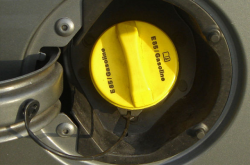
— A GM flex-fuel lawsuit has been dismissed after the plaintiff alleged these General Motors vehicles cannot consistently use E85 (85% ethanol fuel) without damaging the engines.
- 2012-2016 Buick LaCrosse
- 2012-2017 Buick Regal
- 2012-2017 Buick Verano
- 2013-2015 Cadillac ATS
- 2012-2016 Cadillac SRX
- 2012-2017 Chevrolet Caprice PPV
- 2012-2015 Chevrolet Captiva
- 2011-2017 Chevrolet Equinox
- 2012-2019 Chevrolet Impala
- 2011-2017 GMC Terrain
Plaintiff Joli Reid filed the flex-fuel class action lawsuit by alleging the GM vehicles were “supposedly designed to operate on E85 fuel," and since 2006 the vehicles have been equipped with “yellow, corn-colored” filler caps.
GM has allegedly sold millions of flex-fuel vehicles in the U.S. and has publicly stated the vehicles can use E85 fuel or gasoline.
In June 2019, the plaintiff purchased a used 2017 Chevrolet Equinox flex-fuel vehicle that had nearly 19,000 miles on the odometer.
After filling up her vehicle with E85 fuel in August 2019, the check engine and warning lights allegedly illuminated, so the vehicle was taken to a GM dealership.
According to the lawsuit, the service department found the “plunger for the high pressure fuel pump is sticking due to the use of E-85.” The service department further found contaminated fuel needed to be removed from the tank, costing the plaintiff $915.03 for the repairs.
On September 3, the state of Michigan collected a sample of the E85 fuel sold at the gas station and found that fuel sample “met [the] sample acceptability requirements” for E85 fuel.
The lawsuit alleges “internal GM documents state that ‘excessive use of E85’ [fuel] may ‘caus[e] a plunger internal to the fuel pump to stick.’”
GM allegedly knew of the alleged problems with flex-fuel vehicles malfunctioning while using E85 fuel and had issued two bulletins to dealerships:
- Repeat P228C Setting On High Feature V6 Engines While Using E85 Fuel
- Reduced Engine Power, Reduced Engine Power Displayed on Drive Information Center [], Malfunction Indicator Lamp [] Illuminated
Even though the plaintiff says GM advertised the vehicle as being able to handle regular gasoline or flex-fuel, she claims, “GM could readily have notified Flex Fuel vehicle owners that they should fill their vehicles with gasoline at periodic intervals. However, doing so would have diminished the public desire for Flex Fuel vehicles.”
GM Files Motion to Dismiss the Flex-Fuel Lawsuit
GM filed a motion to dismiss the suit and argued three claims should be dismissed because the plaintiff notified GM of the alleged breach of warranty via a letter dated October 11, 2019, but the letter was delivered to GM on October 15 after the suit was filed.
GM argues the letter does not satisfy the requirement that a buyer “must within a reasonable time after he discovers or should have discovered any breach notify the seller of breach or be barred from any remedy.”
According to the judge, pre-suit notice would have alerted GM to the fact the plaintiff thought the failure of her vehicle to operate as expected when she used E85 fuel and being charged for the repairs by the dealer constituted a breach of one or more warranties.
"Here, by failing to provide adequate notice, Plaintiff deprived GM of the opportunity to cure the non-conformance, investigate the claim, or commence settlement negotiations prior to litigation." - Judge Linda V. Parker
General Motors also points out how the plaintiff alleges the automaker represented flex-fuel vehicles “could be consistently used” with E85 fuel or gasoline.
But the judge found none of the lawsuit documents contain representations by GM that E85 can be used “consistently.”
The judge ruled the plaintiff cannot establish her misrepresentation claim based on GM’s statements that flex-fuel vehicles can use E85 fuel or gasoline because the representation was not false. GM only represented that flex-fuel vehicles “can” use E85 fuel.
Additionally, the judge dismissed a claim for deceptive trade practices.
The GM flex-fuel lawsuit was filed in the U.S. District Court for the Eastern District of Michigan: Reid, et al., v. General Motors LLC.




